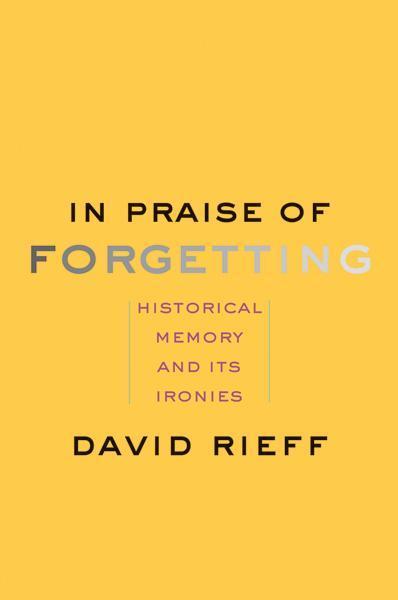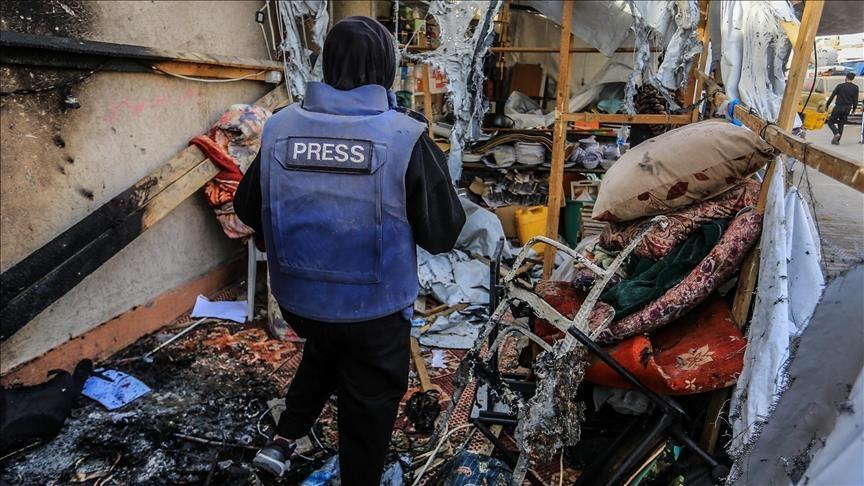In praise of forgetting
William Armstrong - william.armstrong@hdn.com.tr

The shell of the G.P.O. in Dublin in the aftermath of the 1916 Easter Rising, which is among the cases David Rieff studies in 'In Praise of Forgetting.'
‘In Praise of Forgetting: Historical Memory and its Ironies’ by David Rieff (Yale University Press, $25, 145 pages) “In Praise of Forgetting” by American writer David Rieff argues that today there is too much remembering and not enough forgetting. Collective historical remembrance, he writes, has become a “cult” or a “fetish,” manipulating history and even serving as “hatred’s forge.” “At best, it is a consolation or an ego boost, while at worst it is a wallowing … in past triumphs or past injuries and traumas,” Rieff writes. There is simply no evidence that memory can be a deterrent from future evil, which is “magical thinking of a fairly extreme kind.”
“In Praise of Forgetting” by American writer David Rieff argues that today there is too much remembering and not enough forgetting. Collective historical remembrance, he writes, has become a “cult” or a “fetish,” manipulating history and even serving as “hatred’s forge.” “At best, it is a consolation or an ego boost, while at worst it is a wallowing … in past triumphs or past injuries and traumas,” Rieff writes. There is simply no evidence that memory can be a deterrent from future evil, which is “magical thinking of a fairly extreme kind.” Against this, he makes a provocative case for an “ethics of forgetting,” wondering whether a “decent measure of communal forgetting is actually the sine qua non of a peaceful and decent society.” Inspiration for the book came from Rieff’s experiences as a reporter during the Bosnian War in the 1990s, which he says “was in large measure a slaughter fueled by collective memory, or, more precisely, by the inability to forget.”
Collective remembrance, Rieff suggests, can be toxic. He ranges across some of the defining conflicts and tragedies of modern times - Northern Ireland, the American Civil War, the Holocaust, the Balkan wars – to examine its uses and abuses. “Too often,” he writes,
collective historical memory as understood and deployed by communities, peoples, and nations – which is always selective, more often than not self-serving, and historically anything but unimpeachable – has led to war rather than peace, to rancor and ressentiment rather than reconciliation, and to the determination to exact revenge rather than commit to the hard work of forgiveness.
All too often the wound is transformed into the weapon. Against the heavy weight of so many obvious historical tragedies, these arguments are bound to ruffle some feathers.
Still, even in more benign cases French historian Jacques Le Goff was probably onto something when he said “Memory only seeks to rescue the past in order to serve the present and the future.” Rieff agrees. “History is not a menu,” he writes. “You can’t have the solidarity that a national myth helps to form and sustain without the self-absorption, nor can you have the pride without the fear.”
What’s more, it invariably distorts history. “Whatever its purposes, the authority of collective memory depends … on not inquiring too insistently about its factuality and not worrying overmuch about its contingency, but instead allowing ourselves to be swept away by a strong emotion dressed up in the memory of historical fact.” In a 1940 review of “Mein Kampf,” George Orwell observed that Hitler knew “human beings don’t only want comfort, safety, short working-hours, hygiene, birth-control and, in general, common sense; they also, at least intermittently, want struggle and self-sacrifice, not to mention drums, flags and loyalty-parades.” Rieff wants more critical history, but he recognizes its inevitable unpopularity. “Critical anything has always been and always will be a minority taste, while the appetite for the mystical and the authentic is as voracious as it is universal,” he writes.
Rieff draws, Montaigne-like, from a rich hinterland of sources. “In Praise of Forgetting” teems with praise and refutations of John Gray, Avishai Margalit, Tony Judt, Hannah Arendt, and tens of others. It is a bit repetitive and I’m not sure the subject warrants book-length treatment, but overall it is a stimulating meditation.
As I read I was reminded of being in Yerevan last April for the centenary of the Armenian genocide. 1915 remains a huge open wound in Armenia, exacerbated by continued denial on the Turkish side; some Armenians have started to argue that overweening obsession with the genocide is suffocating the country, reinforcing unhealthy habits and preventing society from moving forward. In this context, Rieff’s claim that rubbing raw historical wounds neither remedies injustice nor confers reconciliation seems persuasive.
The book also makes for interesting reading in Turkey, where collective identity is very powerful, memories are long, and where battles over how to shape that memory are fierce. Old grievances are constantly stirred for crude political gain. The question of which historical events should be commemorated (and how) is a turf-war between various social groups. Next month, Turkey’s conservative Islamist government will (once again) mark the 1453 Ottoman conquest of Istanbul with great pomp, after last week sidelining (once again) the republican National Sovereignty Day on April 23.
When there is politics to be made, to hope that people will abandon the past to disinterested historians seems forlorn. Amid Turkey’s never-ending culture wars, Rieff’s recommendations are attractive but sadly unrealistic.
*Follow the Turkey Book Talk podcast via iTunes here, Stitcher here, Podbean here, or Facebook here.










